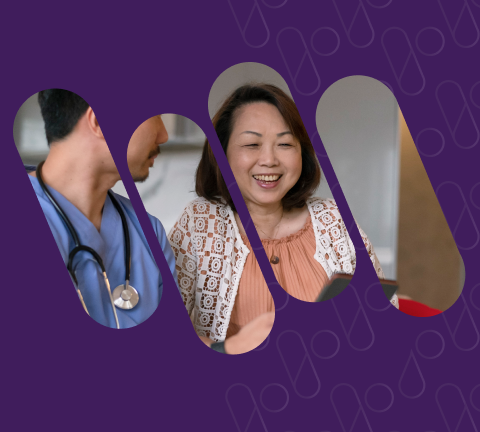Most people will find out the date of their surgery at least 7 days before it is scheduled. This is a good time to consider the things you need to plan for immediately before your surgery.
It is very important you tell your hospital if you are feeling unwell in the 3 days before your surgery. Find out more under the ‘3 days before’ on this page.
If you have questions or concerns about your surgery date or your circumstances change, please speak with your healthcare team as soon as possible.
Questions you might ask your healthcare team:
- What do I bring to hospital? (see our printable checklists)
- What happens to my belongings while I am having surgery?
- Can my family or support person stay with me in hospital?
- Where will I have my surgery?
- Do I need to do a rapid antigen test (RAT) for COVID-19 before I come into hospital?
- What happens if my surgery is cancelled?
- Who do I need to call to cancel my surgery?
Here’s some more information to help you get prepared when your surgery is soon.
Book an extended GP appointment for after your surgery
Did you know that people who see their general practitioner (GP) in the week after leaving hospital following surgery are less likely to go back into hospital with a problem?
When you get a surgery date it’s important to ask your healthcare team if you will need a GP appointment after you get out of hospital. If you do, book an extended appointment time for the week you will be back home.
Your surgeon will provide the outcomes of your surgery and your care plan to your chosen GP, this is called a discharge summary.
Seeing your chosen GP is an important part of monitoring your recovery.
How will I get to hospital?
Hospitals can be hard to find your way around sometimes. When your surgery is booked you should be provided with instructions of where to go and how to get there.
If you can’t find where you need to go when you get to the hospital, you can ask someone at the main reception. Some hospitals also have volunteers who can help you find your way.
Ask your hospital about car parking and pick-up zones so you and your support person know ahead of time where to go.
If you are having difficulty arranging transport speak with your healthcare team.
Questions you might ask your healthcare team:
- What time do I need to be at hospital?
- Where do I go on the day of my surgery?
- Where can my support person park and easily pick me up?
- Who do I call if I’m running late on the day of surgery?
- Will there be any costs from my surgery?
- Who can my support person call to get an update while I’m in surgery?
Week before surgery
Pausing medications
You may need to stop some medications leading up to your surgery, for example, blood thinners. It is essential you understand what these medications might be and that this is discussed with your healthcare team. You can use the printable medications checklist to record this information.
What to bring?
Make sure you have organised to bring things to hospital to make your stay more comfortable.
Things to bring:
- loose comfortable clothing (consider where the surgical wound will be)
- well-fitting shoes
- mobile phone and charger
- toiletries and accessories
- hearing aids and batteries
- glasses
- dentures
- toothbrush, toothpaste, mouthwash, shower gel/soap, shampoo/conditioner, electric shaver, ear plugs, lip balm and hairbrush
- any medication you usually take (in its original package)
- Medicare, healthcare, DVA or private health cards (digital copies are acceptable)
- glasses, hearing aids or other communication aids or devices
- relevant test results, x-rays, or scans.
What not to bring:
- valuables or larger amounts of money (for example, over $20)
- large bags or excessive clothing
- avoid wearing jewellery, nail polish and fake nails, makeup (including false lashes) or contact lenses.
What your healthcare team might ask you:
- Do you have any concerns we haven’t discussed yet?
- Do you feel unwell?
3 days before
If you are feeling unwell in the 3 days before your surgery, it is very important you tell your hospital if you have:
- a temperature or fever (feeling hot or cold)
- a sore throat, cough or other breathing problems
- a rash or swelling
- been feeling generally unwell
- a cut, break or tear in your skin
- diarrhoea or vomiting
- had a recent unplanned visit to an emergency department or local doctor/general practitioner (GP).
Make sure you know the hospital phone number in advance, so you are prepared if this occurs.
24 to 48 hours before surgery
Fasting
Fasting means stopping eating and drinking before your surgery. Fasting is important when having a general anaesthetic as it keeps you safe during your surgery.
Your healthcare team will provide you with clear instructions explaining when to stop eating and drinking.
The time you start fasting can differ depending on your time of surgery. If fasting is done incorrectly, it can delay your surgery as it increases your risk of complications. Talk to your healthcare team if you are unsure about anything.
You can write your fasting instructions on the Prepare for the day of surgery checklist.
Questions you might ask your healthcare team:
- When do I stop drinking and eating?
- Can I fast if I am a diabetic?
- Can I take my regular medications when I’m fasting?
- Do I need to change any of my medications when I’m fasting?
- What happens if I accidentally eat or drink something before surgery?
- When can I start eating again?
Find out about the next stage of your surgical journey, see Day of my surgery.

